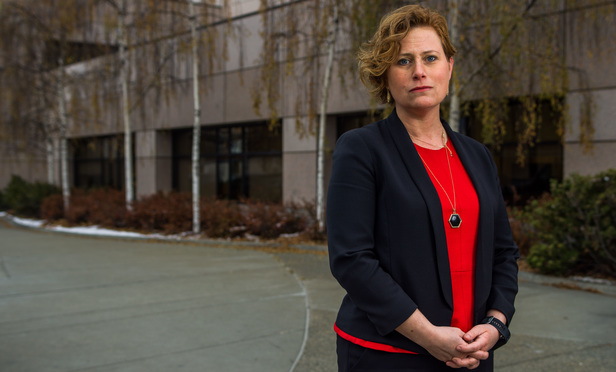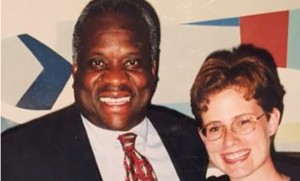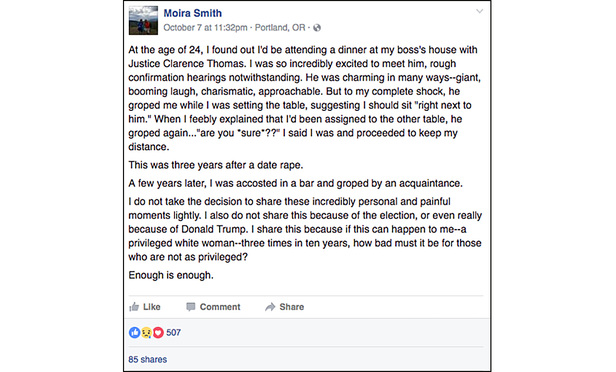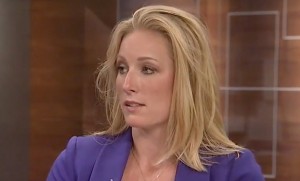 Moira Smith. (Photo: Ash Adams)
Moira Smith. (Photo: Ash Adams)
The anticipation of meeting a U.S. Supreme Court justice for the first time turned to shock and distress for a young Truman Foundation scholar in 1999 when, she says, Justice Clarence Thomas grabbed and squeezed her on the buttocks several times at a dinner party.
On Oct. 7, a night dominated by the disclosure of Donald Trump’s audio-recorded boasts about grabbing women, Moira Smith posted on Facebook a memory of her encounter with Thomas. “He groped me while I was setting the table, suggesting I should sit ‘right next to him,’ ” Smith wrote. Smith, now vice president and general counsel to Enstar Natural Gas Co., in Alaska, was 23 at the time of the dinner party at the Falls Church, Virginia, home of her boss.
Smith’s claim came amid the outrage and ongoing national conversation about inappropriate sexual treatment of women by powerful men, male acquaintances and strangers. The disclosure of the Trump tape has spurred women in startling numbers to come forward publicly with old memories of unwanted touches.
Smith spoke with The National Law Journal/Law.com multiple times by email and phone after she revealed her allegation on Facebook. Her three former housemates during the spring and summer of 1999 each said in interviews they remembered Smith describing inappropriate contact by Thomas after she came home that night from the dinner or early the next morning. They also remembered their own shock and inability to advise her about how to respond. Another Truman scholar that summer, whom Smith would later marry and divorce, said in an interview he “definitely remembered” her sharing with him what had happened soon after the dinner party.
“I have an eight-year-old daughter. Before last weekend, I had subconsciously convinced myself she would never go through this and now I know she almost certainly will,” Smith said in an interview. “I am responsible to help minimize the risks and help her to understand what to do if she does, and to model the behavior that it’s not OK. It has changed my worldview as a mother.”
The National Law Journal/Law.com wrote Thomas requesting comment to the sequence of events that Smith alleged occurred at the dinner in 1999.
Thomas, in a statement through the Supreme Court’s spokeswoman, denied Smith’s allegations.
 “This claim is preposterous and it never happened,” Thomas said.
“This claim is preposterous and it never happened,” Thomas said.
Three other dinner guests—including Louis Blair, the then-head of the Truman Foundation—said they had no prior knowledge about any claim of untoward activity. Blair questioned whether Thomas ever would have been alone with a dinner guest.
Thomas, 68, on Oct. 23 marked his 25th year on the high court. There have been no similar public allegations of inappropriate conduct by Thomas since Anita Hill’s testimony during the justice’s 1991 Senate confirmation hearings. Hill claimed Thomas sexually harassed her verbally when she worked for him at the U.S. Department of Education’s Office for Civil Rights and subsequently when he was chairman of the Equal Employment Opportunity Commission.
Thomas vigorously denied Hill’s allegations during the bitter confirmation hearings. “For almost a decade my responsibilities included enforcing the rights of victims of sexual harassment,” Thomas said then. “As a boss, as a friend, and as a human being I was proud that I have never had such an allegation leveled against me, even as I sought to promote women and minorities into nontraditional jobs.”
Despite his silent demeanor on the bench, Thomas is known inside the court and among friends for his gregarious personality and his love of traveling the country with his wife in their RV. Thomas occasionally speaks at law schools, and at events sponsored by groups that include the Federalist Society and Heritage Foundation, where he delivered remarks Wednesday evening. He has invited law students to the Supreme Court for oral argument and tours of the building.
In her Facebook post, Smith, now 41 and a graduate of the University of California Berkeley School of Law, also publicly recounted two unrelated sexual assaults in her past: a college date rape three years before the Thomas dinner, and a few years afterwards, an acquaintance’s groping of her in a bar. Smith said she did not report the alleged college sexual assault to the authorities.
Smith’s Facebook post, which is no longer visible after she deactivated her page, did not reveal the details of her encounter with Thomas. This reporter reviewed Smith’s post, and the replies, before she made the page inactive. A source first notified the NLJ about Smith’s Facebook post.
In the series of interviews over two weeks, Smith told her story and why she decided to go public after so many years.
“We now know that many men in power take advantage of vulnerable women. That willingness by men in power to take advantage of vulnerable women relies on an unspoken pact that the women will not speak up about it,” Smith said in an interview. “Why? Because they are vulnerable. Because they are star-struck. Because they don’t want to be whiners. Because they worry about their career if they do speak out. But silence no longer feels defensible; it feels complicit.”
Smith’s claim
The Harry S. Truman Foundation was created by an act of Congress and signed into law by President Gerald Ford in January 1975. The new law allowed the foundation to award scholarships “to persons who demonstrate outstanding potential for and who plan to pursue a career in public service,” and to conduct a nationwide competition to select Truman scholars.
Roughly 60 awards are made each year to college juniors. A summer institute also brings about half of each year’s Truman scholars to Washington following their graduation from college, for anywhere from three months to two years and places them in positions with the federal government or national nonprofit organizations. Many scholars have gone on to hold high-ranking positions in government and business.
Smith, a native Alaskan, was a 1997 Truman scholar. After graduating from Georgetown University’s School of Foreign Service in May 1998, she remained in D.C. and started working as a Truman Foundation resident scholar until August 1999.
She found housing that year in northwest Washington with three Wellesley College graduates, one of whom had been a Truman scholar in Smith’s class. The women became friends, each recalled in interviews, but with the passage of years, new families and large geographic distances between them, they have had infrequent contacts with each other.
As the 1998-99 resident scholar, Smith’s main job was to coordinate the foundation’s summer institute, help plan the Truman Scholar Leadership week and support Louis Blair, the executive secretary.
Smith said her “unofficial” duties for the foundation included helping Blair with the dinners he held in his Falls Church home. Amy Hertel Buckley, whose 1999-2000 resident scholar position overlapped Smith’s by three months, also attended the Thomas dinner that evening.
“Moira and I would go early to help with kitchen prep,” recalled Buckley, a graduate of Stanford Law School and now a partner at Education Cities, a national nonprofit that supports city-based education organizations in the effort to improve public schools.
Blair, now retired, had attended culinary school in France and was a gourmet chef, he said in an interview. The dinners, which he cooked himself, were often several courses of French food and were used to network on behalf of the foundation. They usually included special guests at a main table that seated six to eight persons near the kitchen, and then another four to six young scholars at a garden table farther away, near a pond.
In 1999, the foundation decided to create an award in honor of the late U.S. District Judge Joseph Stevens Jr. of Kansas City, a former chairman of the foundation’s board of trustees. Blair asked Thomas, who had known Stevens when they both practiced law in Missouri, to present the first award to David Adkins, who was then a Kansas state lawmaker and former Truman scholar and is now executive director of the Council of State Governments.
The night before the award was to be made at the Supreme Court, Blair held a dinner in his home for Thomas, Adkins and Adkins’ parents and wife, Adkins and Blair said in interviews. Several Truman scholars attended the June 1999 gathering, although neither Blair nor Smith remembered who they were or the exact number.
Smith said she remembered helping with the last-minute preparation of hors d’oeuvres, setting the table and opening bottles of wine. Buckley recalled helping Smith set up that night.
Thomas, Smith said, was sitting in the middle seat of the rectangular table with his right side facing the kitchen.
Alone with Thomas, “I was setting the place to his right when he reached out, sort of cupped his hand around my butt and pulled me pretty close to him,” Smith said in an interview. “He said, ‘Where are you sitting?’ and gave me a squeeze. I said, ‘I’m sitting down at the garden table.’ He said, ‘I think you should sit next to me,’ giving me squeezes. I said, ‘Well, Mr. Blair is pretty particular about his seating chart.’ I tried to use the seating chart as a pretext for refusing. He one more time squeezed my butt and he said, ‘Are you sure?’ I said yes, and that was the end of it.”
Smith said the other guests then assembled for the dinner and she went to the garden table to take her seat. Buckley said she did not recall seeing anything unusual that evening. Smith recalled being “shell-shocked, but also I was there for work. I had a job to do, to be genial as sort of a stand-in hostess.”
 Smith, who posed for a photo with Thomas after the dinner, recalled feeling “conflicted” about the incident.
Smith, who posed for a photo with Thomas after the dinner, recalled feeling “conflicted” about the incident.
“On the one hand, I really liked Justice Thomas,” she said. “He was clearly smart, engaging, and hilarious—he had a booming and totally infectious laugh. On the other hand, I was so confused about what had happened. It had transgressed such a line.”
Smith insisted in the interviews that she did not misconstrue the justice’s action.
“You know when somebody puts an arm around your waist, it would have been overly familiar, but wouldn’t have crossed any boundaries,” she said. “I would have been OK by that and flattered. Instead, he was 5 or 6 inches down and he got a good handful and he kept squeezing me and pulling me close to him. There was definitely pressure and underscored by how close he pulled me to him. Had he said those words and not touched, I’d probably have been flattered. But it felt somewhat menacing and I felt vulnerable. He was seated and I was at a level of intimacy that felt really inappropriate in that setting.”
The recollections of Smith’s roommates
Hours after Smith published her memory to Facebook, a former housemate, Laura Fink, replied to the post: “God M, I remember the Thomas incident. And I remember also all of us being outraged and feeling powerless to help you or stop him. Love to you for your strength and survival of all of this.”
Fink, co-founder and president of Fink & Hernandez, a political consulting firm in San Diego, recalled in an interview that the four housemates sat in their kitchen dining area and talked about the Thomas incident.
“I remember her telling us almost immediately,” Fink said. “We sat there stunned. We were children of the ’90s, and came of age the time of Anita Hill. We were appalled. What I remember her saying is he groped her, grabbed her rear. She had planned that dinner for the Trumans so this was a big deal; she put a lot of work on it. She had to be a professional, so she was worried about saving face and getting through the evening.”
Fink has had a similar personal experience. In 2013, she went public with a charge that San Diego Mayor Bob Filner patted her rear end and made crude comments about her at a fundraiser when she was working as deputy campaign manager of his congressional campaign in 2005. Filner, who resigned, was sentenced to 90 days in home confinement and three years of probation for assaulting three women while in office.
Another of Smith’s former housemates, Carrie Farmer, said in an interview that she remembered Smith telling her about the incident with her and two other housemates soon after the dinner.
“I do remember but my memory of the details is fuzzy,” said Farmer, who later earned a doctorate in health policy at Harvard University and is now senior policy researcher and associate director of the Rand Corp.’s behavioral and policy sciences department in Pittsburgh.
“I remember us sitting down and talking about it. We were all shocked,” Farmer said. “We didn’t have any resources or know what to do. We felt bad for Moira and disappointed that someone in a powerful position would do that.”
The third former roommate, a Truman scholar in Smith’s class, said Smith described a situation “where there was inappropriate behavior, some interaction with Clarence Thomas.” She said she doesn’t remember the exact details. “This kind of thing happens, and it was not unusual to share these encounters, especially young women in D.C.,” said the roommate, a federal government executive with a law degree who declined to be identified by name because of a relative with a pending federal court case.
“I have a lot of respect for her. I have never doubted the veracity of what she is saying in my interactions with her,” the former roommate said.
Another Truman scholar that spring and summer in 1999 was Stanford University graduate Paul Bodnar, now a senior fellow at the Rocky Mountain Institute and until March, special assistant to President Obama and senior director for energy and climate change at the National Security Council.
“I do remember [Smith telling me],” Bodnar said in an interview. “When I saw that [Facebook] post, I definitely remembered it right away. She and I had dinner once at Blair’s home. We were both Truman scholars. To me, her story connects with the memory of that dinner because she told me then that [Thomas] had touched her inappropriately. Obviously it was disturbing to her.”
Blair, the Truman Foundation’s former director, called Smith’s allegation against Thomas “shocking.” He said he remembered the dinner “fondly” as it was the only time he ever hosted a Supreme Court justice.
“I have no recollection of the incident,” Blair said in an interview. “Moira never said anything to me. With a number of people floating around—probably 16 or so of us—in three rooms, I am skeptical that the justice and Moira would have been alone. I was in the kitchen most of the time so I wouldn’t have seen it.”
Blair said he likes to think he was protective of female Truman scholars and noted an incident when another female resident scholar told him a guest had said something inappropriate. “I banished the person from future events,” Blair said.
The Thomas evening, Blair said, was “spectacularly successful.”
David Adkins, the guest of honor that night, said he does not remember seeing anyone at the dinner other than his family, Blair and Thomas—not Smith, not any Truman scholars. He particularly remembered how charming Thomas was to his parents. “In my mind, it was just us there,” Adkins said.
Smith did not tell Blair about what she claims happened.
“He cared very much about promoting the foundation and really valued his contacts in D.C.,” Smith said. “It wouldn’t have occurred to me to tell him probably the most illustrious person who had come to his house for dinner had done that to me.”
The Facebook revelation
After her term with the Truman Foundation, Smith returned to Alaska and worked as special assistant to then Lt. Gov. Fran Ulmer. She moved to Budapest, worked for the Hungarian Helsinki Committee in a project to develop refugee law clinics in central and Eastern Europe and married Bodnar. After a sabbatical to work on Ulmer’s campaign for governor, she began law school at Boston College in August 2003.
Early in the beginning of her second year, her marriage fell apart. That and the stress of law school and volunteer activities took a personal toll, she said. She left law school and returned to Alaska, taking a job with the state Legislature until she resumed law school as a transfer student to the University of California, Berkeley School of Law. She graduated in May 2007 and returned to Alaska, where she subsequently remarried and clerked for then-Alaska Chief Justice Dana Fabe.
Smith’s husband, Jake Metcalfe, is a former chairman of the Alaska Democratic Party. In 2008, he withdrew from a primary campaign for Congress after reports linked his campaign to fake, derogatory websites about another candidate. A former district attorney, he has been executive director of the Public Safety Employees Association since 2009. Federal Election Commission records show Smith contributed to U.S. Senate campaigns of Alaska Republican Lisa Murkowski and Democrat Mark Begich, who lost re-election in 2015.
After working at the boutique firm Ashburn & Mason following her clerkship, Smith joined Enstar Natural Gas Co., one of the state’s largest natural gas distributors, where she is now vice president and general counsel. Smith has been a member of the Alaska bar since May 2008; she has no record of disciplinary history.
On the evening of Oct. 7, Smith was traveling to Portland to see family when she listened to Trump’s boasts, recorded in 2005, about grabbing and kissing women without their consent. While waiting for a ride from the Portland airport, she checked her Facebook page and saw a friend had posted a photo of a laughing Hillary Clinton. Below the photo were the words: “As if those tiny hands could grab ahold of pussy.”
Smith said the meme made her furious.
“We took something serious and just normalized it by laughing at it. Donald Trump said when you’re a star, they let you do it; you can do anything. The idea that we as victims let them do it made me mad,” Smith said. “Sure enough, Justice Thomas did it with I think an implicit pact of silence that I would be so flattered and star-struck and surprised that I wouldn’t say anything. I played the chump. I didn’t say anything.”
Smith said she started writing a Facebook post that night and sent it to her husband. He replied, “TMI” (too much information); she rewrote it and published her memory of the Thomas incident as a private post that restricted who could see her writing. The next morning, on Oct. 8, Smith recalled, she had received requests to more widely share the post.
 Smith decided then to make her Thomas claim more visible on Facebook by sharing it to the “public”—a privacy setting that allows people who are not designated “friends” to see a post. Her post received more than 160 replies before she took down her page about a week later. She did not delete the Thomas post. Apprehensive about the consequences to her family about speaking out now, Smith said she deactivated her Facebook page the week of Oct. 17 because she was “just anxious and I figured it was the first self-protective thing I could do online.”
Smith decided then to make her Thomas claim more visible on Facebook by sharing it to the “public”—a privacy setting that allows people who are not designated “friends” to see a post. Her post received more than 160 replies before she took down her page about a week later. She did not delete the Thomas post. Apprehensive about the consequences to her family about speaking out now, Smith said she deactivated her Facebook page the week of Oct. 17 because she was “just anxious and I figured it was the first self-protective thing I could do online.”
“Since I spoke out on Facebook, I’ve had four colleagues talk to me with stories of date rape, stranger rape, being drugged, unbelievably predatory conduct, touching by people in all kinds of places publicly for which there was zero accountability,” Smith said. “I can understand now that this is not the exception. This is the norm.”
Smith said her support network of family and friends puts her in a position where she can speak up now.
“I don’t gain anything but what I stand to lose is relatively minor compared to people in less stable situations,” she said. “That gives me a feeling of obligation, responsibility. If I can, I should.”
Contact Marcia Coyle at [email protected] and on Twitter @MarciaCoyle.





